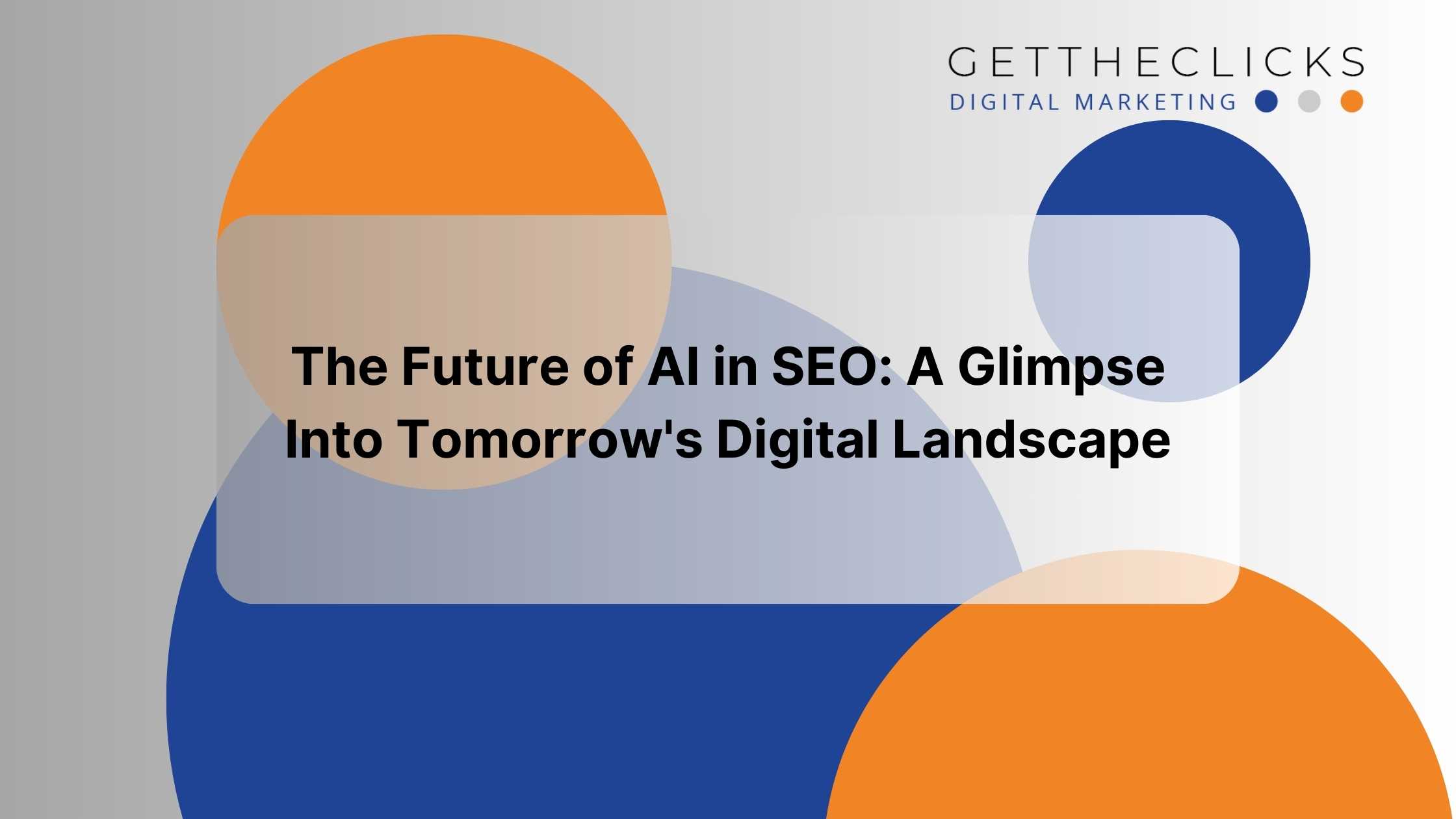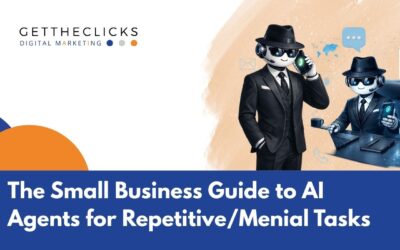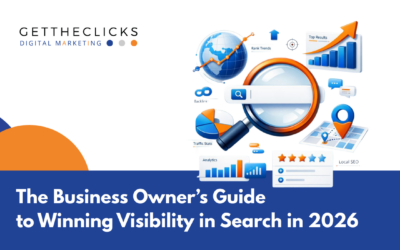In the current evolution of digital marketing, Search Engine Optimization (SEO) stands as a cornerstone for businesses striving to enhance their online visibility and reach their target audience effectively. With the rapid advancements in Artificial Intelligence (AI) technology, the future of SEO is poised to undergo a transformative journey, revolutionizing the way businesses approach online optimization strategies. In this blog post, we’ll delve into the future landscape of AI in SEO and explore the groundbreaking developments that are set to redefine the digital marketing landscape.
Artificial Intelligence Powered Content Creation

Artificial Intelligence powered content creation can revolutionize SEO strategies by providing unique capabilities to analyze, optimize, and generate content that resonates with both users and search engines. Here’s a unique outlook on how AI can enhance SEO through content creation:
AI algorithms can analyze vast amounts of data to identify emerging trends, keywords, and topics relevant to a specific industry or niche. By leveraging these insights, content creators can tailor their content to address the most relevant and timely topics, improving its chances of ranking well in SERPs.
AI-powered natural language processing (NLP) models can understand the context and semantics of content, enabling more nuanced optimization for search intent. Instead of simply targeting specific keywords, content creators can focus on providing comprehensive answers to user queries, which aligns with Google’s emphasis on semantic search and user experience.
AI can automate the process of content creation, producing high-quality articles, product descriptions, and other types of content at scale. This not only saves time and resources but also enables websites to regularly publish fresh, relevant content, which is essential for maintaining search engine visibility and authority.
AI-powered tools can optimize multimedia content, such as images and videos, for search engines. For example, image recognition algorithms can analyze images and suggest relevant alt text and metadata, improving their visibility in image search results. Similarly, AI can generate video transcripts and captions, making video content more accessible and SEO-friendly.
Hyper-Personalization and User Experience Optimization
 AI’s role in hyper-personalization and user experience optimization can profoundly impact SEO strategies by tailoring content and website experiences to individual users’ preferences, behaviors, and intents. Here’s a unique perspective on how AI can enhance these aspects of SEO:
AI’s role in hyper-personalization and user experience optimization can profoundly impact SEO strategies by tailoring content and website experiences to individual users’ preferences, behaviors, and intents. Here’s a unique perspective on how AI can enhance these aspects of SEO:
AI algorithms can dynamically generate personalized content in real-time based on user interactions, demographics, and browsing history. This level of customization not only enhances user engagement but also increases the relevance of content to individual users, leading to higher click-through rates and longer dwell times. By delivering highly personalized experiences, websites can improve their SEO performance through increased user satisfaction and reduced bounce rates.
AI-powered analytics tools can analyze user behavior data to segment audiences and identify distinct personas. By understanding the unique preferences and needs of different user segments, content creators can tailor their SEO strategies to target specific audience segments more effectively. This targeted approach can result in higher conversion rates and improved search engine rankings by delivering content that resonates with the intended audience.
AI algorithms can leverage predictive analytics to anticipate users’ needs and preferences, enabling proactive content recommendations and optimizations. For example, AI-powered recommendation engines can suggest related articles, products, or services based on users’ past behavior and preferences, thereby enhancing user engagement and driving organic traffic. By leveraging AI for predictive recommendations, websites can enhance user experience and retention, leading to improved performance over time.
With the rise of voice search and conversational interfaces, natural language processing powered AI can assist with content optimization for natural language queries and voice-based interactions. By understanding the context and semantics of conversational queries, content creators can optimize their content to match users’ conversational intent, improving its visibility in voice search results and featured snippets. This conversational SEO approach enables websites to adapt to changing search trends and user behaviors, enhancing their overall performance.
AI-powered A/B testing tools can automatically optimize website elements, such as headlines, CTAs, and layout, to maximize user engagement and conversion rates. By continuously testing and iterating different variations of website content and design, businesses can identify the most effective strategies for improving user experience and performance. AI-driven A/B testing enables data-driven decision-making and allows websites to stay agile and responsive to changing user preferences and search algorithms.
Predictive Analytics and Forecasting
 AI-powered predictive analytics will empower businesses to anticipate future trends, identify emerging keywords, and forecast changes in search engine algorithms with unprecedented accuracy. By leveraging historical data, machine learning algorithms can identify patterns and correlations, enabling businesses to adapt their SEO strategies proactively and stay ahead of the curve. This predictive approach to SEO will enable businesses to capitalize on emerging opportunities and mitigate potential risks effectively.
AI-powered predictive analytics will empower businesses to anticipate future trends, identify emerging keywords, and forecast changes in search engine algorithms with unprecedented accuracy. By leveraging historical data, machine learning algorithms can identify patterns and correlations, enabling businesses to adapt their SEO strategies proactively and stay ahead of the curve. This predictive approach to SEO will enable businesses to capitalize on emerging opportunities and mitigate potential risks effectively.
AI algorithms can analyze historical keyword performance data, search trends, and user behavior to predict the future performance of keywords. By forecasting which keywords are likely to gain traction or decline in popularity, businesses can optimize their SEO strategies accordingly, targeting high-performing keywords and adapting content to meet evolving search trends.
AI-powered analytics tools can predict the performance of content based on various factors, such as keyword relevance, engagement metrics, and backlink profile. By analyzing historical data on content performance, AI algorithms can forecast how new content is likely to perform in terms of rankings, click-through rates, and conversions. This enables businesses to optimize their content creation efforts and focus on topics and formats that are proven to resonate with their target audience.
AI algorithms can analyze competitors’ online performance and identify patterns to forecast future trends in the competitive landscape. By monitoring competitors’ keyword rankings, content strategies, and backlink profiles, businesses can gain insights into emerging opportunities and threats in their industry. Predictive analytics can help businesses benchmark their performance against competitors and identify areas for improvement to stay ahead in the search rankings.
Automated Technical SEO Audits and Optimization
 AI plays a crucial role in automated technical SEO audits and optimization by streamlining and enhancing various aspects of the SEO process. Here’s how AI helps:
AI plays a crucial role in automated technical SEO audits and optimization by streamlining and enhancing various aspects of the SEO process. Here’s how AI helps:
AI algorithms can process large volumes of data quickly, allowing for comprehensive analysis of website performance, user behavior, and metrics. This analysis can uncover issues such as broken links, slow page load times, or mobile compatibility problems.
AI-powered tools can identify patterns and trends in website data that human analysts might overlook. This includes recognizing common SEO issues across multiple pages or spotting anomalies that indicate potential problems.
AI algorithms can analyze keyword performance and suggest optimizations to improve rankings. This includes identifying relevant keywords, optimizing on-page content, and suggesting changes to meta tags and headers.
AI can assist in content generation by analyzing search intent and identifying topics that are likely to perform well in search results. It can also generate content outlines or suggest improvements to existing content based on SEO best practices.
AI-Powered Link Building Strategies
 Building high-quality backlinks remains a cornerstone of SEO success, and AI is set to revolutionize the way businesses approach link building strategies. AI algorithms will analyze vast amounts of data to identify relevant link-building opportunities, evaluate the authority and credibility of potential sources, and optimize anchor text distribution for maximum impact.
Building high-quality backlinks remains a cornerstone of SEO success, and AI is set to revolutionize the way businesses approach link building strategies. AI algorithms will analyze vast amounts of data to identify relevant link-building opportunities, evaluate the authority and credibility of potential sources, and optimize anchor text distribution for maximum impact.
By automating the link building process, businesses can enhance their website’s authority, credibility, and search engine rankings while minimizing the risk of spammy or low-quality backlinks. Here are some AI-powered link building strategies:
AI algorithms can analyze your website’s existing backlink profile and identify opportunities for improvement. This includes identifying high-quality backlinks, as well as detecting spammy or low-quality links that may harm your SEO performance.
AI-powered tools can analyze your competitors’ backlink profiles to uncover potential link building opportunities. By identifying websites that link to your competitors but not to you, you can develop outreach strategies to acquire similar backlinks.
AI-powered tools can analyze your existing content and suggest optimizations to make it more link-worthy. This includes identifying gaps in your content, suggesting topics for new content creation, and optimizing existing content for search intent and relevancy.
AI algorithms can assess the quality of potential backlink opportunities based on factors such as domain authority, relevance, and trustworthiness. This helps you prioritize link building efforts and focus on acquiring high-quality backlinks that positively impact your online performance.
By leveraging AI-powered link building strategies, you can improve the efficiency and effectiveness of your link building efforts, increase your website’s authority and visibility in search results, and ultimately drive more organic traffic to your site.
Real-Time SERP Monitoring and Optimization
 AI-powered tools will enable real-time monitoring of search engine results pages, allowing businesses to track keyword rankings, monitor competitor activities, and identify emerging trends in their niche. By analyzing real-time data, businesses can make informed decisions and adjust their SEO strategies on the fly to capitalize on opportunities and maintain a competitive edge. Additionally, AI algorithms will automate the process of A/B testing and optimization, enabling businesses to fine-tune their SEO tactics for maximum effectiveness.
AI-powered tools will enable real-time monitoring of search engine results pages, allowing businesses to track keyword rankings, monitor competitor activities, and identify emerging trends in their niche. By analyzing real-time data, businesses can make informed decisions and adjust their SEO strategies on the fly to capitalize on opportunities and maintain a competitive edge. Additionally, AI algorithms will automate the process of A/B testing and optimization, enabling businesses to fine-tune their SEO tactics for maximum effectiveness.
By leveraging AI for real-time SERP monitoring and optimization, SEO professionals can stay agile, respond quickly to changes in search engine algorithms and user behavior, and continuously improve their website’s visibility and performance in organic search results.
Ethical Considerations and Algorithm Transparency
As AI becomes increasingly ingrained in SEO practices, ethical considerations regarding data privacy, algorithm transparency, and bias mitigation will come to the forefront. Businesses must ensure transparency in their AI algorithms, disclosing how data is collected, processed, and utilized for SEO purposes. Moreover, measures must be implemented to mitigate algorithmic biases and ensure fair and equitable outcomes for all users. By prioritizing ethical AI practices, businesses can build trust with their audience and foster long-term relationships based on transparency and integrity.
In conclusion, the future of AI in SEO holds immense promise for businesses seeking to enhance their online visibility and drive organic traffic. From AI-powered content creation and hyper-personalization to voice search optimization and predictive analytics, the possibilities are endless. By embracing AI technologies and staying ahead of the curve, businesses can position themselves for success in tomorrow’s digital landscape, reaping the rewards of improved search engine rankings, enhanced user experiences, and sustained growth in online presence.





